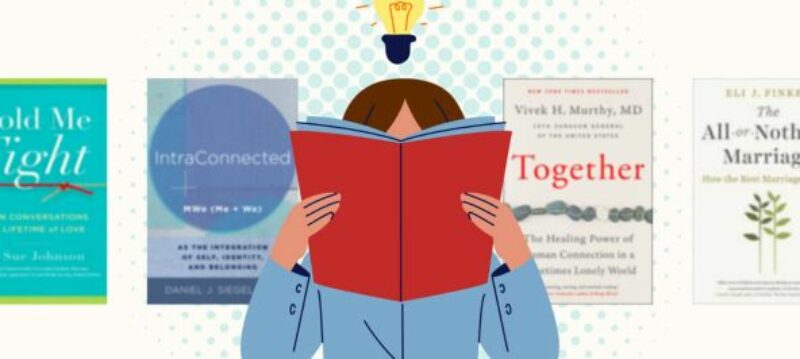“…human transformation ultimately occurs through love—the process of being known and knowing another.”
Dr. Pam King
“Love is the greatest, and may it always be so.”
Dr. Terry Hargrave
As Dr. Pam King wrote in The Reciprocating Self , we grow in and through our “relationship with the divine and the human other.” We were created to be relational, and through relationship, we become who we are. This month we share relationship tips from, or inspired by, four excellent books that we recommend for your summer reading. As much as we need each other, maintaining good relationships can be the hardest thing we do. At the same time, our need for intimacy is just that, a need. It’s in our DNA, and for us to find joy and thrive, we need to feel known, safe, loved, and deeply connected to others.
As Dr. King discussed last month, shifts in the world are contributing to a growing sense of isolation and loneliness. Studies show that when we experience persistent loneliness, we face chronic stress with its cascade of health and mental wellness issues. In order to address the “pandemic” of loneliness, we offer ideas to encourage deeper connection with our partners and communities. Changing our relational habits can be difficult, but small shifts can lead to significant movement and growth. Explore one or all of these books this summer, and maybe try one of the “hacks.” Our hope is that you experience God’s abiding love through the beauty of your relationships, and with His help, and a little insight from psychology, you grow in your capacities to give and receive love.

The U.S. Surgeon General argues that social connections are better than any pill we can take to improve wellbeing. In a recent podcast, Vivek Murthy, offered four ideas that might surprise you with their simplicity.
Four hacks for improving connections
by Vivek Murthy
- Experience your friendships. Spend 15 minutes per day to call or reach out to someone you care about – other than the people you live with. Remind yourself that you have broader circles of relationships and invest in those.
- Give people your full attention. When you are talking with your friends and relations, put your phone down! Attention has the ability to make time seem longer, so a 15 minute conversation can feel like an hour.
- Serve others. When we help each other, we reinforce that we have value and purpose in the world.
- Spend time in solitude. Find time for silence to connect with yourself and reflect. A little time with yourself will fill your tank and help you to understand and manage your emotions. Ideas for alone time include: prayer, meditation (silent or guided), time in nature, sitting on front porch, listening to music.

“Relationships provide the experiential foundations of joining that not only keep us alive but also mold how our brain grows, enabling us to thrive.” Dr. Dan Siegel
While our brains have certain natural capacities for connection, humans have strong tendencies toward in-group/out-group behavior, especially when we feel threatened. According Dan Siegel, M.D., “As we became social creatures, we relied on our connections to one another for survival…we constructed an extension of the life-protecting function…by ascertaining who is in and who’s out…group membership has meant survival for social species for millions of years.” Just being aware of this tendency is an important step, but opening ourselves to diversifying and broadening our in-group provides an important path toward healing.
The other day our team was talking with a friend who offered us an aligned idea. She told us that her pickleball loving friends meet at a public park for exercise and socializing. They have a practice of hospitality around the game – anyone who looks interested is invited to play. Over the last few years their group has grown to a robust number of 25 regular players. The group has so much fun together that they started volunteering in their community. The moral elevation that resulted from a hospitable game of pickleball led to beyond-the-self giving.
Hospitality Hack
- Brainstorm some ideas about offering hospitality in your community. Get creative with the intentional practice of inviting others into relationships.
- Many communities already have these practices in place. Identify them in your community and offer more of them.
- Involve your community in beyond-the-self/group volunteer work or fund-raising.

“Lovehacking involves a deliberate effort to see the beautiful underneath the anger and disappointment and boredom – to look with (appreciative) new eyes.” -Dr. Eli Finkel
Dr. Eli Finkel offers some science backed interventions, tested in his lab at Northwestern University. He asked couples to practice changing perspectives around areas of conflict, and found that the following hacks improved how couples experienced each other. The stories we tell ourselves about our partners matter.
According to Finkel, “Lovehacks have three defining features. First, they don’t take much time. Second, they don’t require any coordination with, or cooperation from, our spouse. Third, they don’t require that we modulate our expectations.”
Lovehacking
by Eli Finkel
- When your spouse lets you down, for example, your spouse is late for dinner, you can: a) think your spouse is a thoughtless jerk – he doesn’t really care about me or, b) think your spouse was late because he got stuck in traffic (or with a client, or on the phone, etc…) – “he cares about me and is really trying to get to dinner on time.”
Offering grace, or telling a story about your spouse that involves external causes that are temporary, assuming your spouse cares for you and isn’t fundamentally inconsiderate, will change the way you respond when your spouse finally arrives for dinner. This simple perspective shift – changing the narrative – shifts the dynamic.
- Reappraising Conflict
- Think about a major area of conflict between you and your partner.
- Imagine a neutral third-party who cares about both of you.
- Imagine what this third-party might suggest to both of you to resolve the conflict.
- “You might find it difficult to think about the conflict from a third party point of view. What gets in the way?”
- Journal about resolving the conflict from the perspective of a neutral third-party several times over the next few months.
According to Finkel’s research, people who practiced this hack, “felt less upset and angry about marital conflict” even when the area of conflict remained unchanged. The practice of reappraising and perspective shifting is a powerful tool for marriage, and it also helps us become more adaptable and resilient to areas of conflict beyond our immediate households.

“Losing connection with our loved one jeopardizes our sense of security.” Dr. Sue Johnson
Relationship expert, Dr. Sue Johnson reminds us that in our relationships with our partners, we need emotional intimacy, mirroring, and touch, and when we don’t receive the emotional support we need – “when love doesn’t work, we hurt.” She helps couples develop deeper emotional intimacy, moving them away from blaming each other in destructive cycles, to identifying tender spots and deepest needs.
Getting out of the blame game
by Sue Johnson
- “…think of a time when you clearly were at fault in creating a minor problem”
example: “I dropped a cup of coffee on the floor.”
- “Now think of your actions in your situation and ways you could have made someone else the bad guy”
examples: “The cup was too hot and the barista should have given me a sleeve;” “Someone stepped on my shoelace and so I tripped over it;” or “You distracted me!”
- “Now imagine a couple of ways your companion might respond negatively to your remarks.”
examples: “You should have asked for a sleeve;” “Why didn’t you stop and tie your shoe before you went to get your coffee?;” “How is it my fault that you dropped your coffee?;” “I was just sitting here!”
Consider: How often do you find yourself blaming others? Does blaming cause cycles of hurt bigger than the initial problem (the dropped coffee)? When we feel vulnerable, we sometimes try to regain emotional control by going on the “attack.”
- Can you imagine a way where you and your partner can name a recurrent problem without getting caught in a cycle of blame and hurt?
- Discuss with each other, or if that is difficult, journal about getting out of the blame game and share with your partner.
Read and Explore
Intentional practices can shift dynamics and provide support. Notice that each “hack” provided here has a beyond-the-self perspective built in. We don’t thrive without contributing to others. If you are a community builder, you might want to engage in the practice of hospitality. If you are struggling in a cycle of blame and hurt with your partner, you might want to practice changing your perspective or narrative. Remember to fill your tank this summer. It’s a beautiful time of year to rest in God’s love and build connections with those who matter most (and read)!
References
Balswick, J. O., King, P. E., & Reimer, K. S. (2016). The Reciprocating Self : human development in theological perspective (Second, Ser. Christian association for psychological studies (caps)). IVP Academic, an imprint of Intervarsity Press.
Finkel, Eli J. (2017). The All-or-Nothing Marriage: How the Best Marriages Work. Dutton Publishers.
Johnson, Sue (2022). Hold Me Tight Workbook: A Couple’s Guide for A Lifetime of Love. Hachette Book Group, Inc.
Murthy, Vivek (2020). Together: the healing power of human connection in a sometimes lonely world. Harper Wave an imprint of Harper Collins Publishers.
Continue Exploring

Practices
A Practice: Patiently Setting Goals toward Purpose
Why is patience so important for achieving our goals? We need patience to stay the course and persevere. Get help with this practice.

Hope
What is the Advent season?
What is the advent season all about? We’ll tell you all about the history, when it starts, and how it’s celebrated.

Love
Fourth Sunday of Advent: Love
The fourth Sunday of Advent represents love. Discover the history, relevant scripture, and how it fits into the Advent season.
Subscribe to our newsletter and get our Thrive Practices for Spiritual Health PDF!
You Got It!

